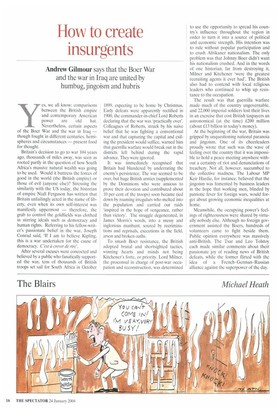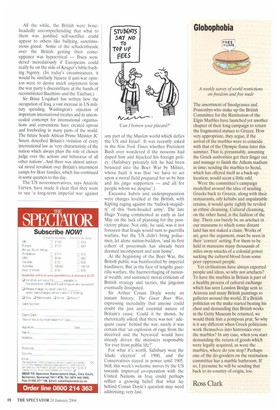How to create insurgents
Andrew Gilmour says that the Boer War and the war in Iraq are united by humbug, jingoism and hubris yes, we all know; comparisons between the British empire and contemporary American
power are old hat. Nevertheless, certain aspects of the Boer War and the war in Iraq — though fought in different centuries, hemispheres and circumstances — present food for thought.
Britain's decision to go to war 104 years ago, thousands of miles away, was seen as rooted partly in the question of how South Africa's massive natural wealth was going to be used. Would it buttress the forces of good in the world (the British empire) or those of evil (anyone else)? Stressing the similarity with the US today, the historian of empire Niall Ferguson has written that Britain unfailingly acted in the name of liberty, even when its own self-interest was manifestly uppermost — therefore, the grab to control the goldfields was clothed in stirring ideals such as democracy and human rights. Referring to his fellow-writer's passionate belief in the war, Joseph Conrad said, 'If 1 am to believe Kipling, this is a war undertaken for the cause of democracy. C'est a erever de rife',
After several excuses were concocted and believed by a public who fanatically supported the war, tens of thousands of British troops set sail for South Africa in October 1899, expecting to be home by Christmas. Early defeats were apparently rectified in 1900, the commander-in-chief Lord Roberts declaring that the war was 'practically over'. Colleagues of Roberts, struck by his naive belief that he was fighting a conventional war and that capturing the capital and exiling the president would suffice, warned him that guerrilla warfare would break out in the districts left behind during the rapid advance. They were ignored.
It was immediately recognised that Britain had blundered by underrating the enemy's persistence. The war seemed to be over, but huge British armies (supplemented by the Dominions who were anxious to prove their devotion and contributed about 10 per cent of the troops) soon became tied down by roaming irregulars who melted into the population and carried out raids 'inspired in the hope of vengeance, rather than victory'. The struggle degenerated, in James Morris's words, into a messy and inglorious manhunt, soured by recriminations and reprisals, executions in the field, arson and broken oaths.
To smash Boer resistance, the British adopted brutal and shortsighted tactics, winning hearts and minds not being Kitchener's forte, or priority. Lord Milner, the proconsul in charge of post-war occupation and reconstruction, was determined to use the opportunity to spread his country's influence throughout the region in order to turn it into a source of political and economic strength. His intention was to rule without popular participation and to crush Afrikaner nationalism. The only problem was that Johnny Boer didn't want his nationalism crushed. And in the words of one historian, far from destroying it, Milner and Kitchener were the greatest recruiting agents it ever had', The British also had to contend with local religious leaders who continued to whip up resistance to the occupation.
The result was that guerrilla warfare made much of the country ungovernable, and 22,000 imperial soldiers lost their lives in an exercise that cost British taxpayers an astronomical (at the time) £200 million (about £13 billion in today's money).
At the beginning of the war, Britain was gripped by unquestioning national paranoia and jingoism. One of its cheerleaders proudly wrote that such was the wave of feeling over the country that it was impossible to hold a peace meeting anywhere without a certainty of riot and denunciations of treachery. Not all, however, succumbed to the collective madness. The Labour MP Keir Hardie, for instance, believed that the jingoism was fomented by business leaders in the hope that working men, blinded by patriotic fever for foreign wars, would forget about growing economic inequalities at home.
Meanwhile, the occupying power's feelings of righteousness were shared by virtually nobody else. Although no foreign government assisted the Boers, hundreds of volunteers came to fight beside them. Public opinion everywhere was massively anti-British. The Tsar and Leo Tolstoy each made similar comments about their passionate joy of reading news of British defeats, while the former flirted with the idea of a French–German–Russian alliance against the superpower of the day.
All the while, the British were boneheadedly uncomprehending that what to them was justified self-sacrifice could appear to others like bullying, sanctimonious greed. Some of the schadenfreude over the British getting their comeuppance was hypocritical — Ibsen wondered incredulously if Europeans could really be on the side of Kruger's bible-bashing bigotry. (In today's circumstances, it would be similarly bizarre if anti-war opinion were to derive much enjoyment from the war party's discomfiture at the hands of reconstituted Baathists and the Taleban.)
Sir Brian Urquhart has written how the occupation of Iraq, a vast increase in US military spending, Washington's rejection of important international treaties and its unconcealed contempt for international organisations and conventions have created uproar and foreboding in many parts of the world. The future South African Prime Minister JC Smuts described Britain's violation of every international law as 'very characteristic of the nation which always plays the role of chosen judge over the actions and behaviour of all other nations'. And there was almost universal moral revulsion over Britain's internment camps for Boer families, which has continued in some quarters to this day.
The US neoconservatives, says Anatole Lieven, have made it clear that they want to see 'a long-term imperial war against any part of the Muslim world which defies the US and Israel'. It was recently asked in the New York Times whether President Bush ever wondered if the neocons had duped him and hijacked his foreign policy. (Salisbury privately felt he had been bounced into the Boer War by Milner, whose fault it was that 'we have to act upon a moral field prepared for us by him and his jingo supporters — and all for people whom we despise') Excessive hubris and underpreparation were charges levelled at the British, with Kipling raging against the 'bullock-stupidity' of this 'bum-headed army'. The late Hugo Young commented as early as last May on the lack of planning for the postvictory phase. Not only, he said, was it not foreseen that Iraqis would turn to guerrilla warfare, but the US didn't bring policemen, let alone nation-builders, 'and its first cohort of proconsuls has already been deemed incompetent and sent home'.
At the beginning of the Boer War, the British public was bamboozled by imperial hardliners. But in the face of lengthy guerrilla warfare, the haemorrhaging of national wealth, and sustained moral criticism of British strategy and tactics, the jingoism eventually dissipated.
Sir Arthur Conan Doyle wrote an instant history, The Great Boer War, expressing incredulity that anyone could doubt the just and essential nature of Britain's cause. Could it be shown, he rhetorically asked, that there was not adequate cause' behind the war, surely it was certain that 'an explosion of rage from the deceived and the bereaved' would have already driven the ministers responsible 'for ever from public life?'
For what it's worth, Salisbury won the 'khaki election' of 1900, and the Conservatives stayed in power until 1905. Still, this week's welcome moves by the US towards improved co-operation with the United Nations in Iraq could perhaps reflect a growing belief that what lay behind Conan Doyle's question may need addressing, very fast.



























































 Previous page
Previous page